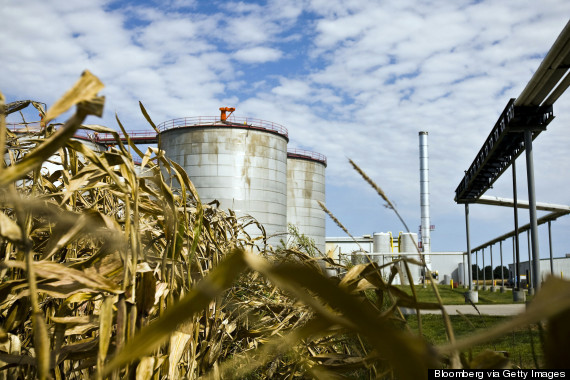If you've ever doubted the saying "the road to hell is paved with good intentions," then you're probably not paying close enough attention.
The world around us is filled with brilliant ideas to enact change for good. But then a little thing called "reality" comes along and makes us realize that our eagerness to make the world better doesn't always turn out as planned. The innovations below all promised to offer pain-free solutions to global problems. If only it were that simple.
Ethanol fuel
Ethanol has been touted by Congress as a sustainable alternative to fossil fuels, but it carries with it a laundry list of complications. For one, 6.5 million acres of conserved land has been lost to ethanol production since 2007, according to a 2013 report by the Associated Press. It's also unclear whether the process of producing ethanol results in a smaller overall carbon footprint than simply sticking with traditional fuels. Likewise, critics contend that using corn to make ethanol drives up food prices, which is problematic for lower income families who often rely on corn-based products.

Quinoa
Quinoa has become popular in the U.S. and Europe as a tasty, healthy and gluten-free alternative to traditional grains. But that popularity has also increased its value, pricing out poorer consumers in Bolivia and Peru who rely on it as their staple grain.
Asbestos
Asbestos may have been successful at preventing fires in office buildings, schools and even hair dryers. But we later learned that if the fibers used to make asbestos are disturbed, the material can cause lung cancer, mesothelioma and other fatal diseases. It's estimated that asbestos exposure will have resulted in more than a half-million deaths by 2040.
Olestra
Olestra held the promise of cutting the fat out of snacking when it was marketed as a miracle food additive in the late 1990s. Turns out that it prevented the body from absorbing important vitamins and also caused cramps, gas and loose bowels.
Tires as artificial coral reefs
When some 2 million used tires were strapped to the sea floor off the coast of Florida in the 1970s, the goal was two-fold: provide a new home for sea-life and re-purpose the spent tires. But the recycled rubber reef wasn't actually very attractive to sea-life and many of the tires were dislodged by Florida's frequent hurricanes, causing them to litter nearby natural reefs and shores.
Wind turbines
Compared to fossil fuels, wind energy is cheaper, conserves water and has fewer carbon emissions, but with that promise comes a few downsides. "Shadow flicker" (seen below) is a strobe light-like effect that reportedly can cause headaches and depression for those living nearby, according to some community doctors. Wind turbines are also responsible for killing thousands of birds and bats each year.
SnackWell's
When the low-fat SnackWell's cookies came out in the 1990s, the intention was to allow consumers to snack guilt-free due to their low-calorie count. But instead of eating responsibly and slimming down, people just ate a lot more cookies, resulting in a phenomenon now known as the "Snackwell effect."
Facebook CEO Mark Zuckerberg continues to extoll the many ways he believes his product will change the world by bringing it closer together. But Facebook might be doing just the opposite to many people. Studies have linked the social media site to lower life satisfaction and feelings of loneliness and depression.
Recycling
Most will agree that a world with recycling is better than a world without it, but the almost universally praised environmental practice does have some issues. Some experts claim that the process, which requires intensive collection and sorting, is both too costly and may actually result in greater carbon emissions than simply throwing the material in the garbage. Still, recycling is becoming increasingly efficient and in 2010 was responsible for keeping 85 million tons of household waste out of landfills.
Thalidomide
Many well-meaning drugs have ended in disaster but one of the worst may be Thalidomide. The drug was given to pregnant women to relieve morning sickness in the 1950s and early 1960s. It was later discovered to have caused severe birth defects in thousands of children.
Waterless urinals
Waterless urinals vastly cut down on wasted water compared to traditional urinals, which use between one to five gallons per flush. But for plumbing systems that use copper pipes, they can cause major problems. Urine has been known to clog pipes or corrode them entirely, ultimately resulting in urine spills.

E-cigarettes
E-cigarettes have been marketed as a healthier alternative to regular cigarettes or as a tool to quit tobacco altogether, but e-cigarettes have plenty of problems. To name a few, they're frequently marketed to kids, contain toxins and don't yet face the same regulations as regular cigarettes.
Subprime mortgages
Under the guise of bringing the dream of homeownership to all Americans, subprime mortgages were sold to many who couldn't afford them during the housing boom. Then the housing bubble burst and the financial crisis hit, causing millions to default on their mortgages and lose their homes.

#Kony2012
This viral documentary set a new precedent for advocacy organizations when it racked up many millions of views on YouTube in a matter of days. But the documentary's message to bring African warlord Kony to justice was criticized for misrepresenting the issue and embellishing certain facts. While praised for drawing attention to a clear injustice, critics lambasted the films Hollywood-style production and oversimplification of a complex issue. Credibility was lost further when the man who created the film, Jason Russell, experienced a very public breakdown. To date, Kony is still at large.
Correction: A previous version of this article wrongly stated that Jason Russell was arrested in San Diego. Russell was taken into police custody but was never charged with a crime.
